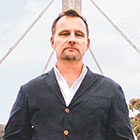

Shawn Parr
Apolis Founders Share 3 Using Business For Good Principles
“What good can I do today?” is a mantra we live by at Bulldog Drummond. It’s a plaque on our wall at the entrance of our office, and it’s an internal message we use and practice daily. And for good reason. This simple statement can change your state of mind, your day, and even your life. One brand that actively challenges us all to put this principle into practice is Apolis Global.
Apolis Global is a socially motivated lifestyle brand that empowers communities worldwide. Through their innovative business model, “Advocacy Through Industry”, they’ve created a revolutionary way to harness the power of business to create social change. Their model is founded on the simple idea that people can live better lives when they’re given equal access to the global marketplace.
Founders Raan and Shea Parton recently shared their three best principles for how they believe any organization can use business for good.
1) Better to start now and small, rather than later and maybe not at all.
If you do not start now, you never will. Waiting for your business to be mature and established before you do good is a mistake. The longer you wait the more complicated and difficult it will be to change your company culture. Rather, start as soon as possible, using your business for good in an effort to build it into the DNA of your organization.
2) Avoid being a trend.
When we started, we saw quite a few other socially minded for-profits and not-for-profits gain some immediate traction in the market. While these organizations were doing great work, many of them struggled to achieve long-term sustainability. With Apolis, we decided from the beginning to be content with gradual progress, and we continue to believe that the most powerful form of social impact takes place through long-term partnerships. Over the past ten years, we’ve only recently begun to to see this patience pay off. We’ve made some good progress recently—solid, sustainable growth that’s resulted in an improved ability to provide social impact, all of which we attribute to a small group of friends and family that have remained patient and supportive throughout the evolution of our brand.
3) The small things are the big things.
Over the years, we have come to realize that if we do not take all the details extremely seriously, we might as well not even try. We have gradually learned this lesson from the intricate details behind hand looming sweaters in Nepal or our most politically charged product, leather sandals created and produced between Israel & Palestine. The details separate a great product from an okay product and we believe if you are responsible with a little, you will be trusted with more.


Uncommon Person: Chad Hutson

Our Internal Learning & Impact at Bulldog Drummond

The One Decision by Employers in 2021 that Means Everything

What I Wish I Knew

Standing Up Inside

Uncommon Person: Gregg Imamoto

Five Things Every Company Should Know about ESG

Redefining Value

Uncommon Person: Chris Baréz-Brown

It’s Time For A Whole Lotta Common Good

Did You Choose Humanity?

Uncommon Partnership: Violux

Here’s How

Uncommon Person: Santhosh Nair

Designing Strategy For A Complex World

Responsibility & Relevance for Brands
